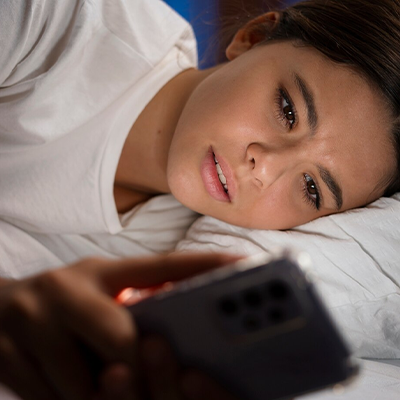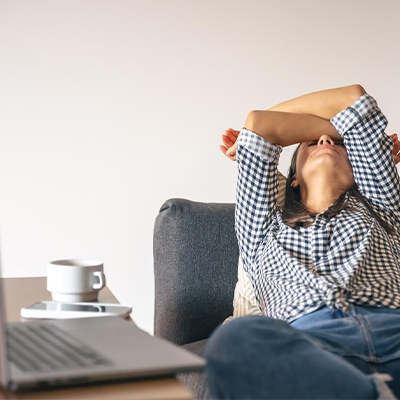
What happens in our bodies with excessive screen time?
From working to watching our favourite shows to even scrolling through those funny videos, we use our screens for nearly every aspect of our lives. Research shows that we spend an average of at least 7 hours looking at a screen every day. This means we spend up to 40% of our waking hours on screens!
When you continuously scroll through your social media feed before bed or wake up in the middle of the night and look at your phone, you are exposing yourself to the blue light that screens emit. This constant exposure can interfere with your sleep cycles and impact the quality of your sleep. Blue light is said to reduce the amount of melatonin that our bodies release. Melatonin is a natural sleep-inducing hormone. Our eye’s natural lens and cornea can protect your retina against UV light but not from blue light.
The hidden consequences of increased screen time on sleep
Today, we’re used to having things available at our fingertips, which is great from a convenience perspective, but not so great from a health perspective. The combination of low movement and high screen time is resulting in several small disruptions to your sleep-wake cycle and you may not even know it.

Here are some of the ways blue light and excessive screen-time can affect your sleep:
1. How sleep x light interact
The human body has an in-built mechanism to regulate sleep known as the Circadian Cycle. The circadian rhythm reacts to external factors such as light and temperature, to release the necessary hormones to induce sleep or wakefulness in the body. With increased screen time, light exposure comes in the way of the natural circadian rhythm, tricking the brain to be active during the night.
2. Disturbed sleep and poor sleep quality
It’s easy to just pick up the phone next to you and mindlessly scroll through Instagram when you are just about to hit the bed. However, screen time before bed can have a rather bad influence on your sleep. Studies show that devices and screen time interferes with your sleep by suppressing the hormone.
Here are some simple tips that you can incorporate into your daily life, to give your body the rest it needs, so you can start sleeping better:
1. Consciously practise digital discipline by taking short, frequent breaks from the screen. Eg. For every 2 hours of screen-time, take a 15-20 minute break, if you can. Use your breaks to move around and get some fresh air to relax your eyes and boost your productivity.
2. Put your phone away, 30 minutes before you go to bed. Instead, use the time to read a book, meditate or be mindful of your breath, so your body has the chance to unwind, relax and prepare for a night of deep sleep.
3. Resist the urge to check your phone if you wake up in the middle of the night.
4. Try using a ‘do not disturb’ mode or a ‘dark screen’ mode available on most phones today, to limit the blue light exposure you have in the evenings.
5. Spend the first 15 minutes after you wake up screen-free. Your mind will thank you for this & you will feel more productive.

Parting Thoughts
We know how integrated screen-usage is with our lifestyles today, but it’s important to find ways to moderate it and be mindful about how we use our screen’s to ensure that it does not affect our health or sleep. Don’t forget to take break’s, breathe, step away from your phone, laptop or TV and take a little time-out for yourself to give your mind the break-it needs to relax, unwind and also help you sleep better.
If you’re continuing to struggle with falling asleep quickly or are unhappy with the quality of rest you are getting, we’d suggest trying Morning Fresh Restful Sleep sachets. They are a mild mix of natural & herbal ingredients that can help re-set your sleep cycles, improve the quality of your sleep and help you wake up feeling rested the next morning.
They are available in multiple variants, so you can choose the one that works best for your body. Simply mix a sachet into a glass of water and take it 30 minutes before your desired bedtime time. Screen’s go off at this time (remember?) so your mind can wind down and prepare to drift off into a night of restful sleep.
